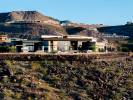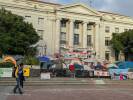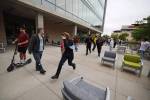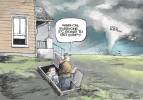G8 exposes rift among leaders on Syria
ENNISKILLEN, Northern Ireland — Deep differences over Syria’s fierce civil war clouded a summit of world leaders Monday, with Russian President Vladimir Putin defiantly rejecting calls from the U.S., Britain and France to halt his political and military support for Syrian leader Bashar Assad’s regime.
But there were also fissures among the three Western nations, despite their shared belief that Assad must leave power. Britain and France appear unwilling — at least for now — to join President Barack Obama in arming the Syrian rebels, a step the U.S. president reluctantly finalized last week.
The debate over Syria’s two-year conflict loomed large as the two-day summit of the Group of 8 industrial nations opened Monday at a lakeside resort in Northern Ireland. The lack of consensus even among allies underscored the vexing nature of the conflict in Syria, where at least 93,000 people have been killed as rebels struggle to overtake Assad forces buttressed by support from Hezbollah, Iran and Russia.
Obama and Putin, who already have a frosty relationship, did little to hide their differing views on the matter while speaking to reporters following a one-on-one meeting on the sidelines of the summit Monday evening. The two-hour meeting marked the first time the two leaders have met in-person since last year.
“We do have different perspectives on the problem,” Obama said plainly of their divergent views on Syria.
The Russian leader, speaking through a translator, agreed, saying, “our opinions do not coincide.”
But despite their seemingly intractable differences, Obama and Putin did express a shared desire to stop the violence in Syria and convene a political conference in Geneva, Switzerland, next month. But it’s unclear who would participate in such a meeting or whether the rebels, given their weakened position, would have any leverage if they did.
U.S. officials say Obama’s decision to send the rebels weapons and ammunition for the first time was an attempt to increase their military strength in order to bolster their political bargaining power. But the American inventory for the rebels is not yet expected to include the high-powered weaponry sought by the opposition, raising questions about whether the deepening U.S. involvement will be effective in changing the situation on the ground.
Obama’s decision to arm the rebels coincided with the White House’s announcement last week that it had definitive evidence of multiple instances of chemical weapons use by Assad’s regime against the opposition. Britain and France have also accused Assad of using the deadly agent sarin, while Russia has publicly questioned the credibility of chemical weapons evidence.
“It’s necessary to refrain from unproven claims by either party,” Putin adviser Alexei Kvasov told reporters at the summit Monday. “We have no evidence proving it.”
Moscow’s continued support for Assad is based in part on Russia’s deep economic and military ties with his regime. Last month, Russia acknowledged it has agreed to sell Syria advanced S-300 air-defense missiles, which are considered to be the cutting edge in aircraft interception technology.
The Russian president’s divisions with Western leaders on Syria were also on display in his separate meetings with British Prime Minister David Cameron and French President Francois Hollande. Both European leaders have previously indicated a willingness to arm vetted Syrian rebels and successfully pushed for the European Union to allow an arms embargo preventing the flow of weapons to expire.
Still, neither country is yet to join Obama in arming the opposition. Following the U.S. decision, there has been growing public concern in both countries over the wisdom of delivering weapons to a country where groups affiliated with al-Qaida are supporting elements of the rebellion.
“I am as worried as anybody else about elements of the Syrian opposition, who are extremists, who support terrorism and who are a great danger to our world,” Cameron said Monday.
Hollande, following his own meeting with Putin, made no mention of a French decision on sending weapons. But he appeared to open the door to some form of deeper involvement from Paris.
“How can you allow Russia to continue to send weapons to the regime of Bashar al-Assad while the opposition gets so few weapons?” Hollande said. “How can we accept the fact that we have proof of the use of chemical weapons without a unanimous condemnation by the international community, and that includes the G8?”
Obama, who has long signaled a preference for deepening U.S. engagement in Syria in conjunction with international partners, was expected to urge his British and French counterparts to join the U.S. in boosting lethal aid to the opposition. Syria was to be the primary topic among the G-8 leaders at a working dinner Monday night.
While Putin did not publicly criticize the U.S. decision to arm the opposition during his meeting with Obama, he exhibited far less restraint Sunday following his meeting with Cameron.
“One hardly should back those who kill their enemies and, you know, eat their organs,” he said, referencing a gruesome Internet video purportedly showing a rebel commander committing an act of cannibalism.
“Do we want to support these people?” Putin asked. “Do we want to supply arms to these people?”
European nations are so far opposed to the idea of establishing a no-fly zone over Syria to stop Assad from using his air power to crush rebel forces or kill civilians. Obama is considering such an option, though his aides have publicly questioned the feasibility, given Assad’s air defenses and the significant costs of such a program.
Perhaps signaling another fight to come between the U.S. and Russia, the foreign ministry in Moscow said Russia would veto a motion to set up a no-fly zone if the U.S. sought authorization from the United Nations Security Council.
———
THE ASSOCIATED PRESSs Jim Kuhnhenn, Shawn Pogatchnik and Vladimir Isachenkov in Northern Ireland and Nataliya Vasilyeva in Moscow contributed to this report.
———
Follow Julie Pace at http://twitter.com/jpaceDC































